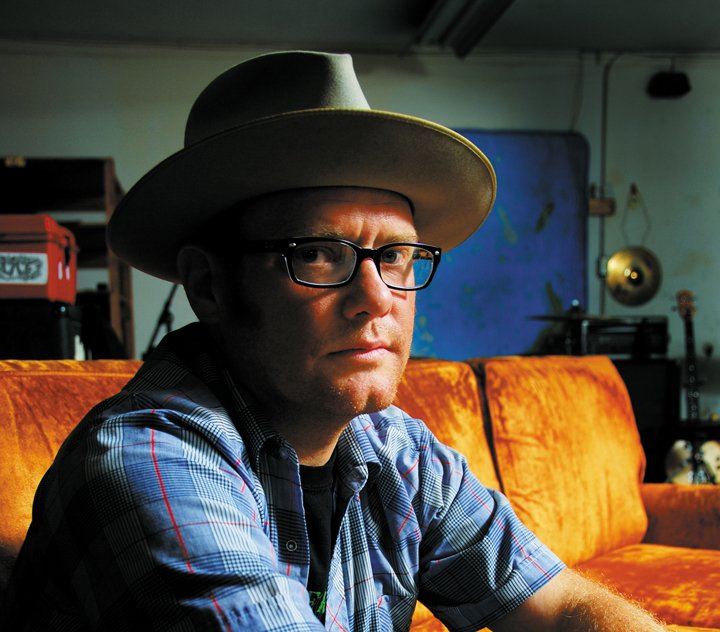When a new Kevin Kerby album arrives at your desk, you take time out and listen to the record. Again and again. And you enjoy it again and again.
Kerby has long been one of those songwriters about town who has consistently created great music. It’s a streak that stretches back to before his days in Ho-Hum, and includes time in Ho-Hum, Mulehead — with its four albums of Arkansas rock — and other bands. Following the end of Mulehead, Kerby wrote and recorded two solo albums. First came The Secret Lives of All Night Radios, and then, picking up backing band Battery, Beautiful & Bright.
Beautiful & Bright, released in 2009, was a record of utter perfection. Rough, tough and rambunctious (“The Last Word on the Situation” and others), but also ... well, using a synonym of its title, completely gorgeous.
With his new nine-track album Apostle’s Tongues, released last week on Max Recordings, Kerby has dropped Battery temporarily, recording a simple, sparse album that explores Kerby’s life. Songs about his sobriety, his family and friends, his faith and his childhood unfold across the 33 minutes of the album. This is Kerby at his most open, and it’s an astounding work — both for its music and for its honesty.
Apostle’s Tongues was recorded by Mulehead drummer and Battery guitarist Geoff Curran, who also adds electric guitar, bass and organ on the album. Kerby’s son Gus Kerby provides fiddle, and former Mulehead guitarist Dave Raymond adds requinto guitar. The other guest on the album is Lucero pedal steel player Todd Beene, an artist who also plays for Glossary.
But it’s Kerby’s album, and he writes all the tunes here, sings them and plays acoustic guitar and piano across the nine tracks.
There’s none of the roaring bar rock of Mulehead on Apostle’s Tongues. The nine tunes are heartland folk along the lines of exceptional songwriters such as Mark Olson, Freedy Johnston and John Hiatt. But way more personal. Calling the album deeply personal is understating it. This is Kerby at his most open, delivering lines such as “To outrun your past sins/Will leave your mule lame.”
The words of the album are front and center as most of the tunes are only Kerby’s strumming acoustic guitar and his scruffy, “14-karat throat.” And the words are bold, as Kerby entrusts listeners with late-night meditations straight from his life. The autobiographical tunes are piercing and raw with their words, but while the tales might get bleak at times, the melodies are golden.
Accompanying the album is a chapbook containing song lyrics from Apostle’s Tongues and photographs from Kerby’s childhood in Texas.
The title track aches with Beene’s pedal steel setting its pace and Kerby kicking off the album with the life lesson of “It’s not the thing that knocks you down/But the way you get back up that makes the difference.” But then there’s the gentle pump of bass and harmony vocals, and the fiddle of Gus Kerby giving the tune a gloaming-filled melody.
“My Suicide” kicks off with Kerby’s acoustic guitar, but the rhythm is sharpened chords, and Kerby’s voice is rugged but warm, as he sings “But the noblest of deaths is sloppy at best” and about how “children change the way you drink.”
Although it’s Kerby’s acoustic guitar guiding the tunes of Apostle’s Tongues, there are instrumental nuances that shade the album. “In a Room Full of Martyrs” gently layers uncoiling electric guitar upon its acoustic melody as it nears its end, and “No One Knows the Words” — where Kerby sings of creationists, the big bang, scientists, nihilists and a blood-covered Christmas tree — offers the clear tinkling of piano on its outro. The songs are stark, but there are textures. Beene’s sterling pedal-steel work colors many of the tunes, including “September Sunsets,” where Kerby offers more life advice with “If you’re ever in need of the rarest breed/She’s a woman who is worth the fight.” “Pharisees and False Love” includes clean electric guitar and organ from Curran.
“I Should Have Gone to the Funeral” throws in mentions of the Robyn Hitchcock-led The Soft Boys and Chevrolet Malibus, along with Raymond’s beautiful requinto guitar intermission. But the words are heavy: “I have a tendency to panic/And take the easy way out/I am surprisingly familiar/With the coward’s route.” Of course, what would one expect from a song titled as such?
The end song is “Brown Bottle Flu,” a fast-paced tune — compared to the other tunes of Apostle’s Tongues — where Kerby notes that “I’m dry but not dried up/That I haven’t reached the bottom/Just the bottom of my cup.”
Anyone who has followed Kerby’s musical career — and that should be any local music fan — has long known the man can write songs that rival the best. That doesn’t change with Apostle’s Tongues. It’s just that the tunes here are of a soul laid wide open. They are thoughtful and true. There is power in the blood of these Apostle’s Tongues’ tunes.
get the music
Kevin Kerby’s Apostle’s Tongues is available through the Max Recordings online store in CD form (including the accompanying booklet) or via digital music outlets.
